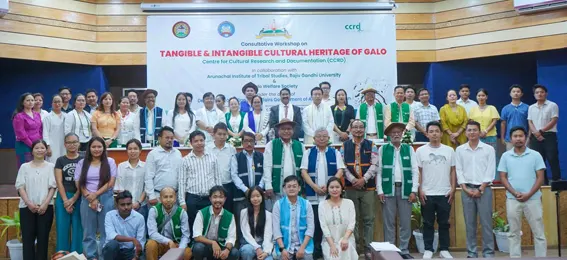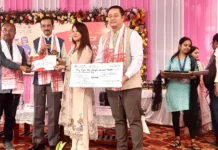CCRD consultative workshop on Galo cultural heritage
RONO HILLS, 25 May: Rajiv Gandhi University (RGU) Vice-Chancellor Prof Saket Kushwaha said that accurate and adequate documentation of heritage is the key to keeping alive the cultural ethos of Arunachal.
Emphasising on adoption of tribal cultural practices in academia, Prof Kushwaha said that “documentation of folklores as well as cultural anecdotes and making them a part of the common stream of knowledge using online sources like Wikipedia is of utmost importance.”
He was speaking at the inaugural session of a consultative workshop on ‘Tangible and intangible cultural heritage of the Galo tribe’ at RGU here on Saturday. It was organised by the Centre for Cultural Research and Documentation (CCRD), which holds the distinction of being one of the pioneering institutions to start working on the documentation of the heritage of Arunachal Pradesh.
The VC suggested adopting traditional dress code in the convocation ceremony of the universities in Arunachal and emphasised “the role of the younger generation to carry forward this legacy of knowledge, handed down to them by their elders.”
Arunachal Pradesh University [APU] Vice-Chancellor Prof Tomo Riba spoke on the importance of speaking in Galo to preserve and promote the Galo culture.
“Preserving language is the foundation for propagation of any culture and this holds true for every tribal society there is,” he opined.
RGU Registrar Dr NT Rikam congratulated the team on “completing such a daunting task” and said that since Arunachal is a culturally diverse state, it is all the more challenging to take on the task of such detailed documentation, which the team has been able to accomplish.
Earlier, Moi Bagra, principal investigator of the project, of which the workshop is a component, presented a briefon the research methodology used for the project.
Stressing on the future scope for research in this area, he informed that “all the documented video and audio recordings of the project will be archived at the indigenous affairs department.”
Eminent personalities from the Galo community, researchers, faculty members and students attended the event, the prime motive of which was to instill a sense of pride among the tribal people of Arunachal about their cultural heritage.
Further, the documentation of this cultural aspect will result in a greater understanding of Arunachal Pradesh at national as well as international levels.
Three technical sessions were held post the inaugural programme, with the first session being on the sub-themes of social customs, customary laws and their significance in modern age; threats or onslaught on the state’s beautiful tradition and culture and the way out of it; and the traditional mode of inheritance, handing over the age-old cultural practices.
Renowned experts from the Galo community, Rural Development Director Hento Karga, RGU Associate Professor Dr Topi Basar, GHCMG Chairman Karbin Kamduk, MPS Itanagar president Dumo Lollen, Industries Deputy Director Geto Orim and APU VC ProfTomo Riba took part in the deliberations.
The session was moderated by Prof Jumyir Basar from the AITS, RGU.
The second session saw speakers such as GIFCC president Dr Emi Rumi, Dr Kirki Ori, and community elders Bai Taba and Komen Zirdo, who shared their expertise on the sub-themes on the role of the priest in the society, and moral conduct in practice and its importance in building the society.
The third technical session covered the role of women in preservation, protection of uniqueness of tradition and culture; practice of polygamy prevalent in the tribal society with reference to the past and present; and role of men and women within the particular tribal society.
Dr Rime Ngulom Potom from TRIHMS, former GWS WW president Mipu Sora Ori, and senior community leaders Gumyir Kato Taba and Gumkir Ete Jini shared their valuable inputs.
The session was moderated by RGU Assistant Professor Gomar Basar.
Coordinator of the research project, Dr Nyajum Lollen said that “the deliberations at the consultative workshop will ensure accurate documentation and data updation of the age-old heritage.”
The workshop was organised in collaboration with the Arunachal Institute of Tribal Studies (AITS), RGU and the Galo Welfare Society (GWS), under the aegis of the indigenous affairs department.


